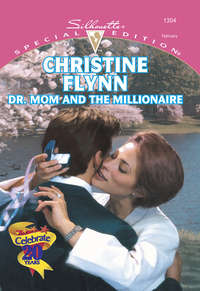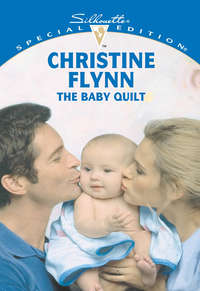
Полная версия
The Housekeeper's Daughter
Maybe you need an older brother, he’d said.
She’d never had a brother, but she supposed that, in many ways, she already thought of him as one.
She hadn’t always, though, she thought, opening the timer box to finish what she’d started to do ten minutes ago. When she was nine years old, and he fifteen, she’d thought of him as the smartest boy in the world. Then she’d turned ten and she had thought of him more as her knight in shining armor.
Timer buttons clicked as she turned off section after section. She could still remember the day he’d made that transition in her mind, how wet and miserable the weather had turned. And how frightened she’d been of the older kids who’d tried to take her lunch money from her at the bus stop. She could remember Gabe, too. How big and brave and commanding he’d seemed even then.
He had been enrolled in Briarwood at the time, an exclusive prep school miles in the opposite direction of the public school she’d attended. He hadn’t let the fact that he’d gone so far out of his way, or that he would be seriously late, stop him from helping her, though. He’d seen what was going on, rescued her with the cool, steel-eyed glare that still had lesser males backing away and driven her to school himself. He’d pulled right up in front of Thomas Jefferson Elementary in the shiny new Jag his parents had given him for his sixteenth birthday and let her out as if he were her own private chauffeur.
She’d been in serious puppy love with him at ten, and had a wild crush on him as a teenager. As a young woman, she’d been in awe of him and all he was accomplishing, and terribly grateful for his support when her father had died.
It had been Gabe who had helped her through the deep sadness she’d felt at the loss of her dad, because Gabe had loved and respected him, too. And it had been Gabe who had prevented even more upheaval when it had appeared that she and her mom would have to move from the groundskeeper’s cottage.
The cottage had been her parents’ home ever since they’d lost their farm in Kentucky some twenty years before and gone to work for the Kendricks. The tidy little house just inside the woods was a benefit provided to the groundskeeper as part of his salary. It was their home when Addie had been born. But since her father no longer held that position, she and her mom weren’t entitled to stay there.
Mrs. Kendrick had been terribly kind. She had waited nearly two weeks after the funeral before she’d asked Addie’s mom to move up to the servants’ quarters in the main house so she could hire another man. Mrs. Kendrick had assumed that at nineteen, Addie would be on her own, that she would either go back to school or get a job in town.
Everything had happened so quickly that Addie hadn’t had time to consider her own plans. Her only concern had been for her mom. The thought of leaving the cottage and the memories her mom had shared there with her dad had all but devastated the grieving woman.
Addie had never known her mom to be anything less than stoic. She’d also had no idea what to do to help her until Gabe had suggested that she take over her father’s job herself.
She would never have thought of approaching Mrs. Kendrick on her own. Aside from being totally intimidated by the famous woman and not at all accustomed to speaking up for herself, she hadn’t felt qualified to take over such a responsible position. But Gabe had insisted there was no one better qualified, and reminded her of how she had helped her father with his chores from the time she’d been old enough to dig in the dirt. There wasn’t a tree, flower or stretch of lawn on the property that she couldn’t propagate, name or mow. Because her father’s ailing heart had slowed him down so much, she had already dropped out of college to help him so he wouldn’t work so hard. Or lose his job. In his final weeks she’d been handling his job alone as it was.
A young woman definitely hadn’t been Mrs. Kendrick’s idea of a proper groundskeeper. But she hadn’t wanted to take Rose from her home, either, so she had given Addie a six-month trial.
That had been five years ago. As grateful as Addie had been to the woman then, she’d been even more grateful to her son.
The problem was that now she wasn’t sure what she felt toward Gabe beyond something too complicated to question.
Being her practical, pragmatic self, she didn’t question it. She simply accepted that she had always cared for him, always would and headed off to make sure the florists didn’t damage her topiaries with their ribbons and tiny white lights before she had to join her mother in the main house. All the rooms would need straightening while the houseguests were at the wedding.
Addie didn’t usually pull housekeeping duty. On the few occasions she had, she’d truly hated it, which meant she definitely wasn’t looking forward to it now. Knowing she would be in the main house that evening only added to the disquiet she couldn’t quite seem to shake.
That odd unease accompanied her on her way to the house a little after six o’clock that evening. The ceremony had begun, and with everyone’s attention on the couple exchanging vows by the reflecting pond, no one noticed her slip from the opening in the trees a city block away and hurry across the cobblestone drive between the main house and the garage.
The side door, or the servants’ entrance as it was known by the family, led to a utility room and on into the kitchen.
Addie didn’t mind being in those particular rooms. The kitchen was Olivia’s domain, and Addie had found the open space with its miles of glass-fronted cabinets, hanging pots and herbs growing on the windowsills to be as warm and inviting as the woman herself. She’d just never been comfortable in the mansion’s more vast and elegant spaces. Mostly, she suspected, because she knew she didn’t belong there.
As a child, she could use only the servants’ door when she needed her mother. And never was she allowed beyond the doors of the kitchen and servants’ areas themselves. She had been a teenager before she’d set foot in the main foyer, and then only because she’d helped her dad bring in and hang the fresh greens they’d made into holiday wreaths and garlands for the staircases and mantels.
As she headed inside now, she carried a bunch of brilliant red and gold asters she’d cut for the servants’ dining table. She didn’t come to the main house often, but when she did she always brought flowers for Olivia and the maids to enjoy.
The scent of something buttery and delicious drew her through the utility room with its deep sink and cabinets for boots, servants’ coats and cleaning supplies. Grabbing an old china teapot for a vase from a cupboard, and scissors from a drawer, she smiled at Olivia working at the center island and stopped at the sink to arrange the flowers.
“Come on in here and do that,” Olivia called, rubbing her nose with the back of her forearm since her hands were covered with flour. “As long as there’s no bugs, you can use my sink.
“Oh, you brought my favorite,” she observed, seeing what Addie carried when she entered the high-ceilinged room. “I just love those bright colors.” As long as her arm was up, she nudged at the white headband holding back her tight salt-and-pepper curls. “So, did you see her?”
“Who?” Addie asked, bundling vase and flowers past the island.
“Tess, of course,” Olivia replied, as if she couldn’t imagine who else they’d be discussing. “The bride?”
“I didn’t see anyone.” Preoccupied, trying not to be, she set her flowers on the spotless counter and turned on the faucet. “I came up by the garages.”
“Well, she looks like a vision,” the loquacious cook pronounced. “I can’t begin to imagine what that gown cost, but I’m sure I could feed half the county on what they’re spending out there.” She lifted a hand toward a golden-brown casserole on the stove, flour drifting like snow. “We’re having tuna noodle as soon as we get finished up here. There’s plenty if you don’t feel like cooking for yourself tonight. I’m making pecan pies for lunch tomorrow, for those who aren’t leaving first thing. First batch will be out in ten minutes if you want a slice.”
Olivia’s pies were pure sin. Addie would have loved some, too, had her appetite not disappeared on her way into the house.
“Would you mind if I take it home with me?”
“Of course I don’t. I wouldn’t have offered it if I didn’t want you to have it,” she replied with a tsk.
“I don’t suppose you peeked inside the tent to see how everything looked,” she continued, sprinkling ice water into her stainless steel bowl.
The ends of Addie’s short, blunt-cut hair swung as she shook her head.
“Didn’t think you would,” Olivia concluded, adding a pinch of salt. “You’re not nosy enough. Must get that from your mother. Not that she isn’t nosy,” she qualified. “She just doesn’t talk that much about what she knows. Anyway, I didn’t get down there, either. But I hear that the extra tent behind the big one is the caterer’s kitchen. Your mom said they have fifty people running around down there putting the final touches on beef Wellington and salmon Oscar. Can’t imagine not working in my own space.”
Her brow pleated as she gathered the ball of dough from the bowl and plopped it on the marble rolling board. “What are you doing up here yourself? I’d have thought that after all the hours you put in the past week, you’d be taking the evening off and spending it with your fiancé.”
Addie finished filling the vase and reached for a stem of crimson red asters. “Mom needs the help.”
There was so much to do with all the extra houseguests. More people created more laundry, more cleaning, more messes and Addie knew her mom was already exhausted. Even with Ina and the new girl working, Addie also knew her mom wouldn’t quit tonight until everything was as close to perfect as she could get it. All week her mother had left the cottage an hour earlier than her usual 6:00 a.m. and returned far later than her usual eight, after dessert had been served and the dishes all done.
Her mom had always prided herself on her ability to run the Kendrick household to Mrs. Kendrick’s rather exacting standards. But since Addie’s dad had died, her mom had become even more obsessed with doing her job exactly right.
Addie would have felt incredibly guilty knowing she was resting and her mom was not.
“I’m sure she’ll appreciate it,” the cook confirmed on her way back from the double-wide refrigerator, cold marble rolling pin in hand. “There’s not a one of us who couldn’t use an extra hand right now. Can’t believe the hours we’ve put in to get everything ready and stay on top of everyone’s needs. But that’s what we’re paid for,” she murmured philosophically.
“So,” she continued easily, putting her shoulders into rolling out a quick neat circle of dough, “what kind of wedding are you having?”
“Something small,” Addie’s mom pronounced, walking in from the laundry room with an armload of freshly laundered and folded towels. Addie swore her mother had radar for hearing. She could pick up a conversation three hundred yards away. “Or maybe they should just elope. I’d be willing to pay for that myself.”
Consideration joined the fatigue in Rose’s eyes as she glanced toward her daughter. Even after running herself ragged all day, her dark hair and black uniform looked as painfully neat as always. “You know, Addie, if you did that,” she said, setting her stack on the counter, “you and Scott could get married whenever you want. You wouldn’t have to spend all that time planning and reserving and waiting for a dress to come in.”
“You’re not paying for my wedding, Mom.”
“Do you have a date in mind?” Olivia asked.
Addie hesitated.
“No,” Rose replied, speaking for her daughter as she pulled one of her ever-present lists from her pocket. “I keep telling her she needs to do that so we can reserve the church and get invitations ordered.”
“You just said they should elope.”
“Well, they need to do one or the other. It’s not good to leave something like this hanging. Long engagements aren’t necessary.”
Olivia folded her circle of dough in two and expertly slipped it into a glass pie plate. “Are you waiting until after you graduate?”
Addie opened her mouth.
“I certainly hope not,” Rose insisted, before Addie could say a word. “That would be over a year and a half from now. She’d be graduating sooner if she hadn’t taken those extra courses Gabe talked her into,” she murmured, disapproval in her tone. “What’s an elementary school teacher going to do with botany classes, anyway?”
“They did help her discover that old garden outside of town,” Olivia reminded her.
“Well, that’s taking up her time, too. She could be using the effort she’s putting into that, into planning her wedding.”
While Olivia helpfully pointed out that Addie could probably do both, and the women proceeded to debate the financial merits of eloping rather than having a wedding, Addie diligently forced her attention to the stems she carefully arranged in the bright vase.
Losing herself in the simple beauty of the flowers, appreciating the colors, textures and pretty shapes, appealed far more to her than considering how little her own opinion mattered when it came to deciding her future. The cook and her mom talked as if she weren’t even there, as if she were as invisible to them as she was expected to make herself as she went about her daily chores.
Being invisible was familiar. So was her mom’s criticism and the guilt Addie always felt when her mom found fault with the choices she’d made. Both of her parents had wanted more for her than to tend someone else’s home and land. Addie’s dad had insisted on college. But her mom had never thought that four years of college was necessary. She’d considered secretarial school more practical because Addie could have a career and leave the estate that much sooner.
Addie had never felt any great need to leave the sprawling grounds. She loved working with the plants and the land and she had far more freedom being outdoors than her mother did working inside. But she hadn’t wanted to disappoint either of her parents, so she had decided that she would teach because she herself loved to learn. And, being practical, there would always be a need for teachers.
Her mother had ultimately, grudgingly, been satisfied with that. But she had also made it clear that she thought the extra classes Addie had taken last winter a waste of time and money. Addie had loved the botany courses, but they couldn’t be used toward her major, and taking them had kept her from taking classes that could. Her mom had thought Gabe quite cavalier for suggesting them, too, because people like the Kendricks could afford to indulge casual interests, but people like them definitely could not.
Addie swallowed past the familiar sense of defeat tightening her chest. Her mom had always insisted that setting one’s sights too high resulted only in disappointment, and she wanted badly to save her from that.
Addie knew her mom meant well. But it was so hard to work for something when someone was always pulling back on your leash. She couldn’t count the times her mom had remarked on how long it was taking her to get her degree. Because she needed her job to afford school, she worked full-time from spring through mid-December and attended college in Petersburg, seventy miles away, during winter term. A term a year was not exactly a land speed record.
Her mom also made a point of occasionally mentioning that she could have had an office job by now, and that at the rate she was going, she might not ever graduate. Considering that she would then have no degree and no training, she’d have no choice but to spend the rest of her life as the Kendricks’ groundskeeper, a fate of which her mother definitely did not approve.
At least with her engagement, the possibility of living on the estate and serving the Kendricks for the rest of her life had been eliminated. Now, her mother’s focus was simply on getting her married.
The way her mother kept pushing, it was almost as if she was afraid Scott would back out on Addie if she didn’t commit to a date soon. When her mother had said before that a long engagement wasn’t necessary, what she’d really meant was that a long engagement could be broken.
He has a good job, she reminded her at every opportunity. And he’s good to you. That’s as good as it gets, Addie. A man like that won’t wait around forever.
It had done Addie no good to point out that her mom would have to move to the main house once Addie quit her job there. Her mom had said that after so long she was ready to move, anyway. The cottage wasn’t the same without Tom, and she’d be closer to her work.
Before her mom could start in on any of her arguments again, Addie turned with the artfully arranged bouquet, set it on the table where the servants ate and grabbed the towels.
“Tell me where these go and what else you want me to do.”
Oblivious to the impact of her comments, Rose headed for the cabinet-and drawer-lined hall between the kitchen and the laundry.
“You can take those up to Marie in the family wing,” she continued while Olivia walked over to stick her nose into the blooms. “She’s trying to make some order out of the bedrooms. I’ll do the same in the guest wing after I help Ina down here.”
Pulling out a plastic basket loaded with rags and furniture polish, she handed it to Addie and stuffed in a plastic bag for trash. “Ina is running the vacuum in the living room and dining room and straightening both. If you’ll bring in the glasses and ashtrays from the library and straighten up in there, we should be finished well before people start trickling back in.
“And, Addie,” she said, checking over the fresh jeans and long-sleeved burgundy T-shirt she’d changed into, “when you’re finished, go out the front door. People will be milling around out back by then.”
Addie thought nothing of the reminder to remain out of sight. She’d heard so many similar requests over the years that she simply did it automatically, slipping around like a small ghost whenever family or guests were near.
She moved that way now as she used the butler’s door that led into the huge marble foyer and hurried up the nearest side of the curving, chandelier-lit double staircase to leave the towels on the antique sideboard at the top of it. She didn’t know which of the rooms Marie was in, but her mom or the new maid couldn’t miss seeing them there.
She barely glanced at the gilt-framed landscape hanging above the sideboard, or the brass sconces flanking the enormous work of art. Anxious to escape the nagging sense that she didn’t belong there, she hurried right back down the stairs, her footsteps soundless on the thick burgundy runner, and headed across the spoke pattern in the marble tiles that radiated from beneath the foyer’s round entry table.
She had no idea which rooms were whose upstairs. Except to drop off the towels just now, she’d never set foot up there before. She knew several of the rooms downstairs, though. As her dad had done before her, she brought in the garlands for the fireplace mantels every December.
The monotonous hum of the vacuum cleaner grew louder as she passed the enormous living room with its groupings of gold damask sofas and chairs and butter-colored faille walls. She kept going, the hum receding, as marble floor gave way to a Persian hall runner, and walked through a set of carved mahogany doors.
The lingering scent of expensive cigars mingled with more expensive leather, old books and lemon oil. Empty cocktail glasses and soda cans occupied end tables and the coffee table across from the open television armoire.
Intent on getting in, getting the job done and getting out, she left her basket on the round game table, opened the wide floor-to-ceiling French doors to let in some air and turned to pick up pieces of a children’s game from the floor.
Applause filtered through the open doors. Moments later the lilting strains of “Ode to Joy” drifted inside.
They were playing the recessional.
Addie sat back on her heels. It wasn’t just being where she didn’t belong that made her feel especially uneasy tonight. It was knowing that her mom was probably right. Scott was a good man. He wouldn’t want to wait forever.
He wanted to marry her now. He’d told her so when he’d proposed three weeks ago. He’d mentioned it again when she’d seen him the night before last. Though her mother didn’t know, Scott definitely did not want to wait until she graduated. He wanted to help her through school himself.
She didn’t know why she hesitated to set a date.
Setting a handful of plastic game pieces on the table, she stepped through the doors and onto the curved balcony. Down by the reflecting pool with its garland-wrapped Roman columns and cascades of white flowers, she could clearly see the hundreds of gowned and tuxedoed guests. They occupied row upon row of white chairs perfectly angled to have caught the sunset.
Now, in the fading twilight, the glow of hurricane candles lit the aisle, adding to the radiance of the bride as she and her groom moved down the length of white, petal-strewn carpet. A dozen attendants in as many shades of lavender followed the trailing swath of white gown and veil, along with the beaming parents and guests a few moments later.
Two dozen waiters in white dinner jackets funneled from the gazebo, bearing silver trays of champagne to carry into the elegant crowd. The string quartet continued to play, the sounds lovely and classical. The tiny white lights the florists had strung began to twinkle everywhere.
Addie stepped closer to the railing. It didn’t matter that she was apparently suffering bridal jitters herself, the scene was magical.
She would never know such a wedding. Even if she’d had the means to create the fairy tale, she couldn’t imagine being in front of that many people. Or having to converse with them afterward. Her knees would freeze, her tongue would tie and she would forget everything she ever knew about anything of any interest at all.
The scene absorbed her, drew her closer—and kept her from wondering why she felt more and more trapped.
She could see Gabe on the fringes of the milling assembly. He shook the hand of an older gentleman, then gallantly kissed the hand of the gray-haired matron with him. He moved on, clapping another guest on the back, buzzing a kiss across the cheek of a lady wrapped in a gold lamé stole. Two men came up to him, offering their hands as if to introduce themselves. With his back to her, she couldn’t see what he did, but she knew he would have accepted their handshakes, made them feel welcome and at ease. He had a gift for that. He would draw them out, listen to what they had to say. He had a gift for that, as well. She knew, because he’d done it so very often with her.
He would have been easy to pick out of nearly any crowd. He stood taller than the rest, his presence more powerful, more commanding somehow. He definitely commanded her attention in the moments before he turned and his glance swept the empty space behind him.
As if he knew he was being watched, his glance searched the house a moment before he started to turn back. As he did, his glance moved up.
Her heart gave an odd little jerk when he seemed to notice her. For several unnerving heartbeats, he stared at where she stood half-hidden in the shadows.
The dim lighting made it impossible to clearly see his expression. Still, remembering how unhappy he’d seemed with her, he managed to knot the nerves in her stomach once more before a woman in a strapless gown approached him with another gentleman and he turned to take two flutes of champagne from a passing waiter.
Stepping back into the shadows, she turned to do what she should have been doing all along. No good could come from being idle. Her mother had drilled that into her from the time she’d entered school. Her father had taught her that it was all right for a person to not be doing something so long as they were using that time to recharge their batteries with nature, a long walk or a good book.








